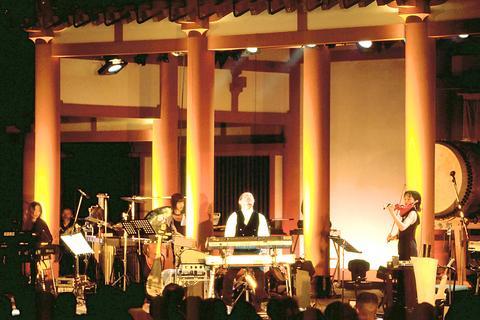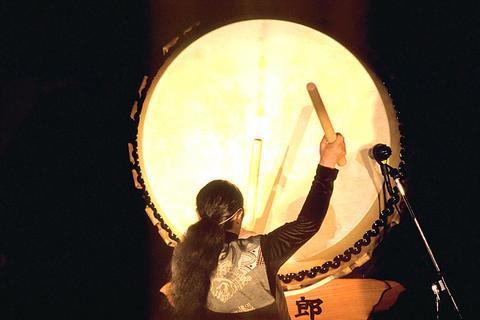Kitaro is an artist who is admired for being one of the most important new-age musicians, as much as he is disparaged for coming up with spiritual nonsense. To his fans he is beacon of hope for humanity, while his detractors dismiss him as an airhead.
The Japanese guitarist and multi-instrumentalist is to play two shows at the Taipei International Convention Center next week, on Tuesday (Sept. 7) and Wednesday. So get your tickets quick, if you're one of his fans, as promoters last night said 80 percent were already sold.

Kitaro, who was born Masanori Takahashi and whose stage name means "man of joy and love," was born into a Buddhist/Shinto farming family in central Japan, taught himself the electric guitar as a high school student and started his first group, the East Family Band, in 1970.

His breakthrough came 10 years later when he created the music for Silk Road, a documentary about the overland trade route from Europe to Japan. Having found his formula for success, Kitaro has been successfully playing variations on a similar theme for the past quarter of a century.
As a composer, he believes that his music is created by some external power and told Rolling Stone, "This music is not from my mind. It is from heaven, going through my body and out my fingers through composing. Sometimes I wonder. I never practice. I don't read or write music, but my fingers move. I wonder `Whose song is this?' I write my songs, but they are not my songs."
Currently on a tour of Asia, the Grammy- and Golden Globe-winning artist was recently made an ambassador of peace by Earthdance, a group that promotes universal love and goodwill.
He was given the "Artist of Peace Award" and will headline "the world's largest synchronized music and lifestyle event" at an arena in Kuala Lumpur on Sept. 18, with a prayer for peace that will be broadcast around the globe.
Last year, he came up with the Grammy-nominated Sacred Journey Of Ku-Kai and last month Domo Records released Reinterpretations, a compilation of remixes by "high-profile and hot underground producers," who put their "unique spin on timeless music that unites, heals and soothes the human spirit," according to his publicists.
For his Taipei shows, the 51-year-old will appear with a 12-piece backing band of experienced Japanese musicians, many of whom have played at prominent jazz festivals around the world, in their own groups.
Some of the better-known names are his wife Takahashi Keiko on piano; Manabu Takahashi, guitar; Shinji Ebihara on keyboards; Yayoi Sakiyama, violin; Tmoko Nomura, percussion and Ono Kideo on drums.
A sneak preview of the expected playlist for the shows includes (the inevitable) Theme from Silk Road, tunes from the influential 1983 record Caravansary, Peace Bell Symphony (1988), Heaven and Earth (1994), Cocoro Part 1 from last year and a few other selections from one of the longest back catalogues on record.
Whatever your take is on crystal healing, universal love and the power of prayer, Kitaro is a remarkable artist and professional who always puts on a good show. For his followers, he can do no wrong, the skeptical may be converted.
The Taipei International Convention Center (ICC) is at 1, Xinyi Road, Sec 5, Taipei (台北市信義路5段1號). The shows start at 7:45pm. Tickets are from: http://www.ticket.com.tw.

The primaries for this year’s nine-in-one local elections in November began early in this election cycle, starting last autumn. The local press has been full of tales of intrigue, betrayal, infighting and drama going back to the summer of 2024. This is not widely covered in the English-language press, and the nine-in-one elections are not well understood. The nine-in-one elections refer to the nine levels of local governments that go to the ballot, from the neighborhood and village borough chief level on up to the city mayor and county commissioner level. The main focus is on the 22 special municipality

The People’s Republic of China (PRC) invaded Vietnam in 1979, following a year of increasingly tense relations between the two states. Beijing viewed Vietnam’s close relations with Soviet Russia as a threat. One of the pretexts it used was the alleged mistreatment of the ethnic Chinese in Vietnam. Tension between the ethnic Chinese and governments in Vietnam had been ongoing for decades. The French used to play off the Vietnamese against the Chinese as a divide-and-rule strategy. The Saigon government in 1956 compelled all Vietnam-born Chinese to adopt Vietnamese citizenship. It also banned them from 11 trades they had previously

Hsu Pu-liao (許不了) never lived to see the premiere of his most successful film, The Clown and the Swan (小丑與天鵝, 1985). The movie, which starred Hsu, the “Taiwanese Charlie Chaplin,” outgrossed Jackie Chan’s Heart of Dragon (龍的心), earning NT$9.2 million at the local box office. Forty years after its premiere, the film has become the Taiwan Film and Audiovisual Institute’s (TFAI) 100th restoration. “It is the only one of Hsu’s films whose original negative survived,” says director Kevin Chu (朱延平), one of Taiwan’s most commercially successful

Jan. 12 to Jan. 18 At the start of an Indigenous heritage tour of Beitou District (北投) in Taipei, I was handed a sheet of paper titled Ritual Song for the Various Peoples of Tamsui (淡水各社祭祀歌). The lyrics were in Chinese with no literal meaning, accompanied by romanized pronunciation that sounded closer to Hoklo (commonly known as Taiwanese) than any Indigenous language. The translation explained that the song offered food and drink to one’s ancestors and wished for a bountiful harvest and deer hunting season. The program moved through sites related to the Ketagalan, a collective term for the